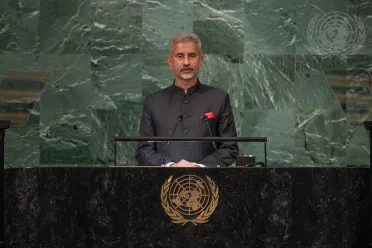Statement
Statement summary
SUBRAHMANYAM JAISHANKAR, Minister for External Affairs of India, stressed that the international landscape has faced a sharp deterioration, with the effects of the conflict in Ukraine adding to the challenges of countries recovering from the COVID-19 pandemic. Pointing out that the global South will be the most impacted by these crises, he underscored that the inequity of vaccine distribution should not be replicated in other domains. On the war in Ukraine, he emphasized that his country is on the side of peace, which calls for dialogue and diplomacy as the only way out. It is in his country’s interest to find an early resolution, he added.
Highlighting that his country has had to contend with other challenges, especially in its region, he stressed the need for the international community to rise above narrow national agendas. He reported that his country had sent 50,000 metric tons of wheat along with medicines and vaccines to Afghanistan, extended credits of $3.8 billion to Sri Lanka for fuel, essential commodities and trade settlement, and supplied 10,000 metric tons of food aid and vaccine shipments to Myanmar. To combat climate change, he emphasized that his country remains deeply committed to working in line with the United Nations Framework Convention on Climate Change and the Paris Agreement. He also added that his country’s stance is based on the principle of common but differentiated responsibilities and respective capabilities, considering different national circumstances.
His country will assume the presidency of the Group of 20 this December, he said, noting that reforming the governance of multilateral financial institutions will be one of its core priorities, along with addressing issues such as debt, economic growth, food and energy security, and environment. Also noting that India was Chair of the Counter-Terrorism Committee this year, he called for a global architecture that responds to the new technical tools deployed against open, diverse and pluralistic societies. Having borne the brunt of cross border terrorism for decades, India firmly advocates a zero-tolerance approach. Finally, on Security Council reform, he noted that, while his country is completing its tenure this year, it is prepared to take up greater responsibilities. However, it seeks to ensure that the injustice faced by the global South is addressed through such a process. Calling for serious negotiations on this matter to proceed sincerely, he emphasized: “They must not be blocked by procedural tactics. Naysayers cannot hold the intergovernmental negotiations process hostage in perpetuity.”
Full statement
Read the full statement, in PDF format.
Photo

Previous sessions
Access the statements from previous sessions.
